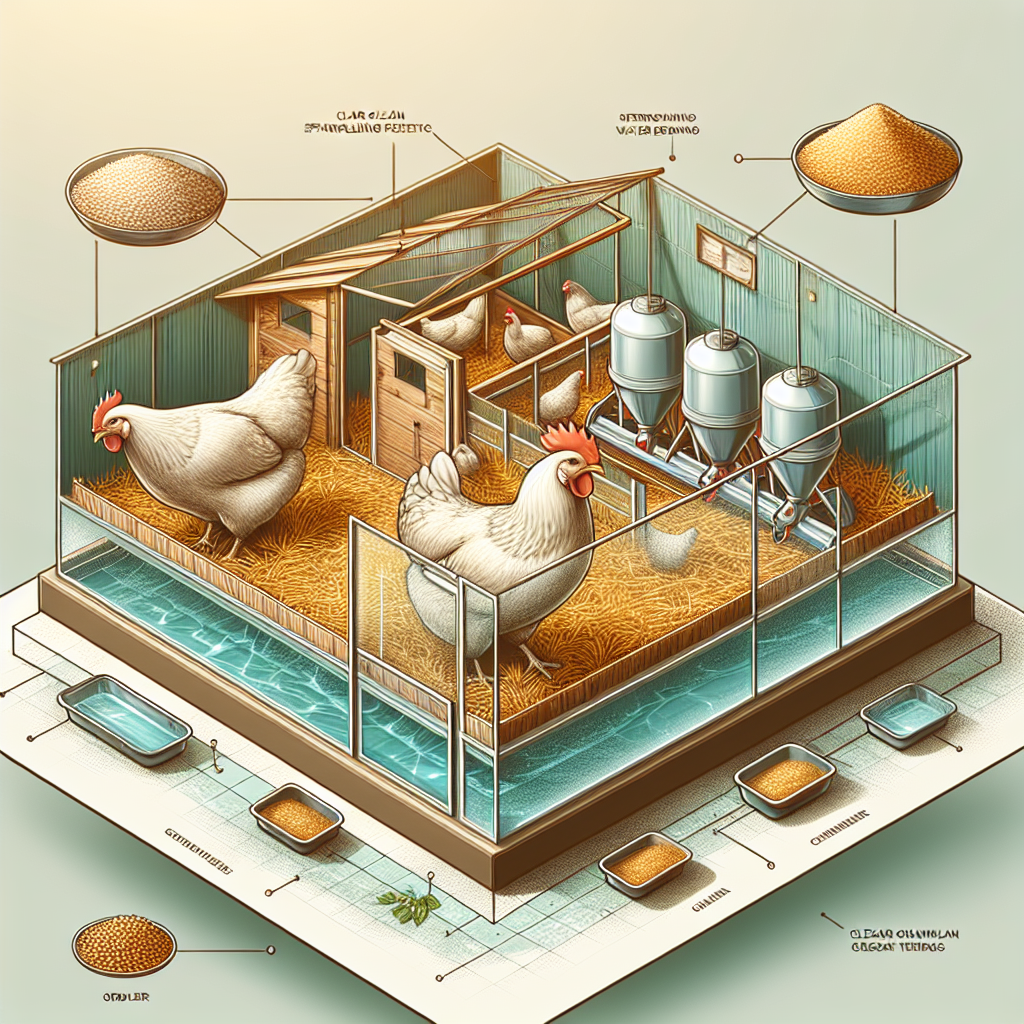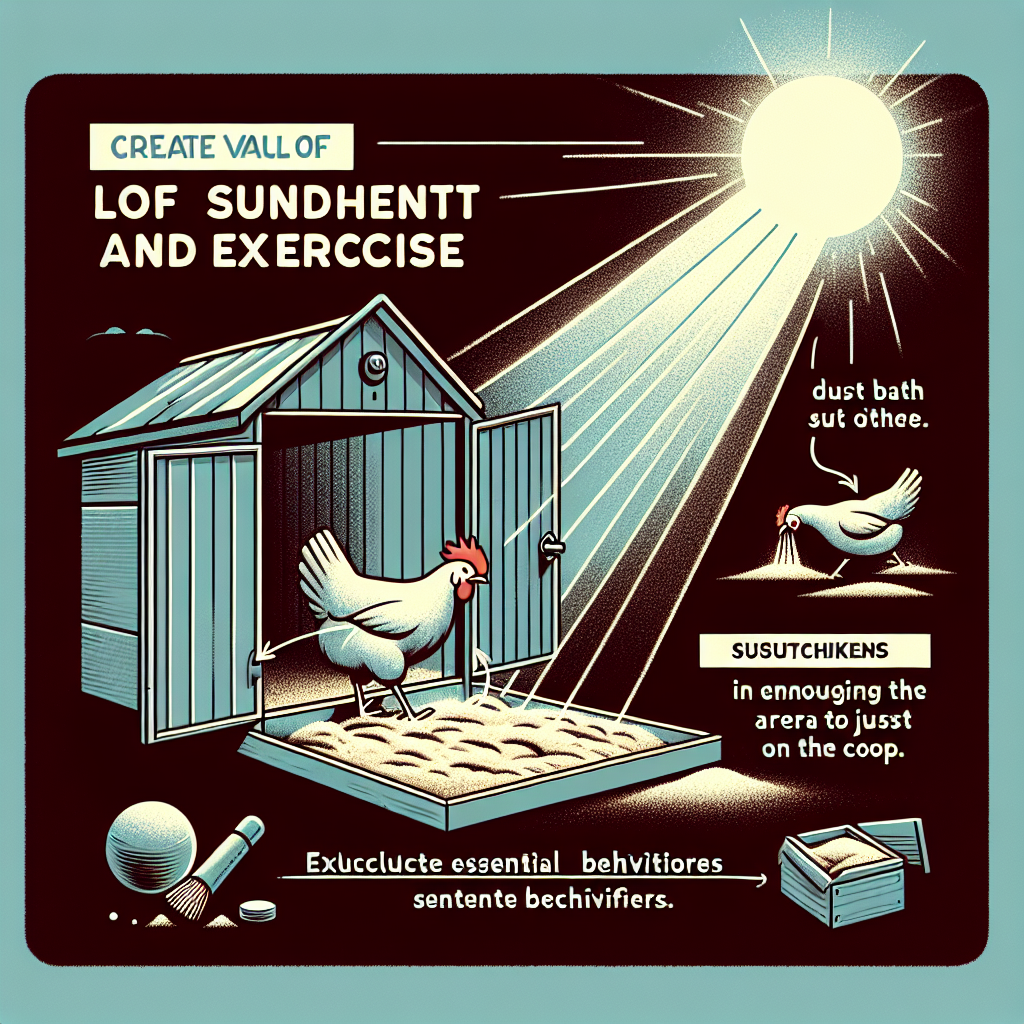Keeping your chicken coop clean is essential to maintaining the health and well-being of your feathered friends. Regular cleaning not only helps to prevent the spread of diseases but also ensures a pleasant and odor-free environment. However, deciding how frequently you should clean the chicken coop and change the bedding can be a bit tricky. In this article, we will explore some important factors to consider, such as the size of your coop, the number of chickens you have, and the weather conditions in your area. By the end, you will have a clear idea of how often you should undertake this important task to ensure a happy and healthy home for your chickens.
Best Practices for Cleaning
Cleaning Schedule
Having a regular cleaning schedule is essential to maintaining a healthy and hygienic chicken coop. By following a consistent routine, you can ensure that the coop remains clean and safe for your chickens. A well-planned cleaning schedule will also help you stay organized and prevent any tasks from being overlooked.
Daily Tasks
Certain cleaning tasks should be performed daily to keep the coop tidy and comfortable for your chickens. One of the most important tasks is to remove the fresh droppings. Accumulated droppings can lead to unsanitary conditions and potential health hazards for the chickens. Additionally, providing fresh water and food for your chickens on a daily basis is crucial for their health and well-being. This ensures that they have access to clean water and uncontaminated food.
Weekly Tasks
In addition to the daily tasks, there are specific cleaning tasks that should be done on a weekly basis. Removing soiled bedding is essential to prevent ammonia buildup and maintain a clean environment. It is also important to clean the feeders and waterers regularly to prevent bacteria growth and ensure that the chickens have access to clean food and water. Additionally, weekly inspections for any damage or wear in the coop should be conducted to promptly address any issues.
Monthly Tasks
To maintain a healthy coop, certain tasks should be performed on a monthly basis. Thoroughly cleaning the entire coop is crucial to remove any dirt, dust, or debris that may have accumulated over time. This cleaning should include scrubbing the walls and floor, as well as removing any cobwebs. Additionally, replacing bedding materials is important to ensure that the chickens have a clean and comfortable living space. Monthly inspections for pests or infestations should also be done to catch any problems early on.
Seasonal Tasks
Certain cleaning tasks should be done seasonally to adapt to changing weather conditions. For example, in the winter, it is crucial to insulate the coop and provide extra bedding to keep the chickens warm. In the spring, deep cleaning and sanitizing the coop can help prevent the spread of diseases and parasites. In the summer, ensuring proper ventilation and offering shade to the coop can help keep the chickens cool. And in the fall, cleaning out any fallen leaves or debris from around the coop can prevent pests from finding their way inside.
Factors to Consider
Number of Chickens
The number of chickens you are keeping will play a significant role in determining how often you should clean the coop. More chickens will generate more waste, which means the coop will need to be cleaned more frequently. It is important to adjust your cleaning schedule accordingly to accommodate the number of chickens in your flock.
Size of Coop
The size of your coop will also impact the cleaning frequency. A smaller coop may require more frequent cleanings, as the space can become dirty and crowded more quickly. On the other hand, a larger coop may allow for more time between cleanings, as the chickens have more room to move around and waste may be distributed more evenly.
Weather Conditions
Weather conditions can affect the cleanliness of the coop as well. Wet or rainy weather can cause the coop to become muddy and damp, leading to increased odors and the potential for bacteria growth. In such conditions, more frequent cleanings may be necessary. On the other hand, dry weather may allow for longer intervals between cleanings.
Health of Chickens
The health of your chickens is a crucial factor to consider when determining the cleaning schedule. If you have any sick or injured chickens, it may be necessary to clean the coop more frequently to prevent the spread of diseases or infections. Monitoring their health and adjusting the cleaning routine accordingly is vital to keep them safe and promote healing.
Cleaning Techniques
Removing Chicken Litter
Removing chicken litter is an important part of maintaining a clean coop. Chicken litter consists of droppings and bedding materials, such as straw or wood shavings, that have become soiled. To remove the litter, start by wearing gloves and a mask to protect yourself from potential pathogens. Use a shovel or rake to scoop up the soiled litter and place it in a compost bin or dispose of it properly. Make sure to remove all visible droppings and thoroughly clean the area where the litter was located.
Clearing Cobwebs and Dust
Cobwebs and dust can accumulate in the coop over time, creating an unsanitary environment for your chickens. Regularly clearing cobwebs and dust is essential to maintain a clean and comfortable living space. Use a broom or brush to sweep away cobwebs from corners, ceilings, and walls. Dust the surfaces of the coop, including perches and nesting boxes, using a damp cloth or a feather duster. Pay special attention to any hard-to-reach areas where dust and cobwebs may accumulate.
Disinfecting the Coop
Disinfecting the coop is a critical step in preventing the spread of diseases and keeping your chickens healthy. Choose a disinfectant that is safe for poultry and follow the instructions on the label. Start by removing all bedding materials and debris from the coop. Thoroughly clean all surfaces, including walls, floors, and nesting boxes, using the disinfectant solution. Pay close attention to areas that may have come into contact with droppings or other contaminants. Allow the coop to dry completely before adding fresh bedding.
Repairing and Maintaining the Coop
Regularly inspecting the coop for any damage or wear is important to prevent further deterioration and maintain a safe and secure environment for your chickens. Replace any damaged or rotten wood, repair any holes or cracks, and fix any broken perches or nesting boxes. Properly maintaining the coop will not only extend its lifespan but also minimize the risk of injury or harm to your chickens.
Common Mistakes to Avoid
Infrequent Cleaning
One of the most common mistakes in chicken coop cleaning is infrequent cleaning. Neglecting to clean the coop regularly can lead to the accumulation of droppings, ammonia buildup, and unsanitary conditions. It is important to establish a consistent cleaning schedule and stick to it to ensure a clean and healthy environment for your chickens.
Improper Bedding Materials
Using improper bedding materials can also be a mistake when cleaning the chicken coop. Choosing the right bedding materials is essential to provide comfort, absorb moisture, and control odor. Avoid using materials like hay or straw, as they can become moldy and attract pests. Opt for materials such as wood shavings or shredded paper that are absorbent and easy to clean.
Neglecting Ventilation
Proper ventilation is crucial for a healthy chicken coop. Neglecting to provide adequate airflow can result in poor air quality, excess moisture, and the buildup of ammonia. Ensure that your coop has enough ventilation openings, such as windows or vents, to allow fresh air to circulate. Regularly check that these openings are not blocked or obstructed.
Not Checking for Mites or Parasites
Another common mistake is neglecting to check for mites or parasites in the coop. These pests can infest the chickens and cause various health problems. Regularly inspect the coop for any signs of infestation, such as mite droppings or eggs. If an infestation is detected, take immediate action to eliminate the pests and treat the affected chickens.
Signs of an Unhealthy Coop
Strong Odors
One of the clear signs of an unhealthy coop is the presence of strong odors. Ammonia buildup from accumulated droppings can create a pungent smell that indicates poor air quality. Regular cleaning and proper ventilation can help eliminate odors and prevent their recurrence.
Excessive Moisture
Excessive moisture in the coop can lead to a range of problems, including mold growth and the development of bacterial infections. Wet bedding, leaky roofs, or poor drainage can contribute to moisture buildup. Regularly check for dampness or wet areas and address the underlying causes promptly.
Presence of Flies or Insects
The presence of flies or insects in the coop is a sign that the environment is not clean or well-maintained. Flies and insects can spread diseases and disturb the chickens’ well-being. Take action to eliminate any flies or insects and implement measures to prevent their return.
Agitated or Unhealthy Chickens
Your chickens themselves can provide valuable insight into the health of their living environment. Agitated or stressed chickens may indicate an uncomfortable or unsanitary coop. Additionally, chickens that consistently display signs of illness, such as decreased egg production or unusual behaviors, may be directly affected by an unhealthy coop. Regularly observe your chickens for any signs of distress or poor health.
Benefits of Regular Cleaning
Preventing Disease
Regular cleaning of the chicken coop is essential for preventing the spread of diseases. Accumulated droppings and unsanitary conditions can harbor bacteria, parasites, and other pathogens that can make your chickens sick. By maintaining a clean and hygienic coop, you can significantly reduce the risk of disease outbreaks among your flock.
Reducing Odors
A clean coop helps to minimize odors associated with chicken waste. Regularly removing accumulated droppings and maintaining proper ventilation prevents the buildup of ammonia and the resulting strong odor. This creates a more pleasant environment for both your chickens and yourself.
Improving Egg Quality
A clean coop can have a positive impact on egg quality. By providing a clean and comfortable environment for your chickens, you are promoting their overall health and well-being. Healthy chickens are more likely to produce high-quality eggs with strong shells and vibrant yolks.
Creating a Pleasant Environment
Regular cleaning of the coop not only benefits the chickens but also creates a pleasant environment for you as the caretaker. A clean and well-maintained coop is more enjoyable to work in and makes daily chores more manageable. It also provides a better backdrop for you to interact with your chickens and build a stronger bond with them.
Determining a Cleaning Schedule
Number of Chickens
The number of chickens you have will influence the frequency at which you should clean the coop. Generally, the more chickens you have, the more frequently the coop will require cleaning. Larger flocks produce more waste, which means more frequent removal of droppings and bedding materials.
Coop Size
The size of the coop is another factor to consider when determining the cleaning schedule. A smaller coop may require more frequent cleanings due to limited space and the quick accumulation of waste. Conversely, a larger coop allows for more time between cleanings, as the chickens have more room to move around and waste may be distributed more evenly.
Litter and Bedding Type
The type of litter and bedding materials you use in the coop can also affect the cleaning schedule. Some materials may require more frequent changes than others. For example, wood shavings are known to be highly absorbent and can be left for longer periods before they need to be replaced. Understanding the specific properties of the materials you choose will help you determine the appropriate cleaning intervals.
Environmental Factors
Environmental factors, such as weather conditions and the presence of pests, can impact the cleanliness of the coop. Wet or humid conditions may require more frequent cleanings to combat moisture buildup and prevent the growth of mold or bacteria. Additionally, if your area is prone to pests, you may need to adjust your cleaning schedule to stay ahead of potential infestations.
Daily Cleaning Tasks
Removing Fresh Droppings
Daily removal of fresh droppings is essential to maintain a clean and hygienic coop. This task helps prevent the buildup of waste, reduce odors, and minimize the risk of disease. Using a shovel or rake, carefully scoop up the droppings and place them in a compost bin or dispose of them properly. Make sure to wear gloves and a mask to protect yourself from any potential pathogens.
Providing Fresh Water and Food
Daily provision of fresh water and food is crucial for the health and well-being of your chickens. Ensure that the waterers and feeders are clean and free from debris. Refill them with clean water and fresh feed to ensure that your chickens have access to uncontaminated resources. Regularly check and clean any automatic feeders or waterers to maintain their functionality.
Checking for Sick or Injured Chickens
Daily checks for sick or injured chickens are important to address any health issues promptly. Observe each chicken carefully for any signs of illness, such as lethargy, loss of appetite, or abnormal behavior. Conduct a visual examination for injuries, wounds, or abnormalities. If you notice any concerns, isolate the affected chicken and seek appropriate veterinary care if necessary.
Weekly Cleaning Tasks
Removing Soiled Bedding
On a weekly basis, the removal of soiled bedding is crucial to prevent ammonia buildup and maintain a clean environment. Using a shovel or rake, carefully remove the soiled bedding and dispose of it properly. Make sure to wear gloves and a mask to protect yourself during this task. After removing the soiled bedding, replace it with fresh and clean bedding materials.
Cleaning Feeders and Waterers
Weekly cleaning of feeders and waterers is essential to prevent bacterial growth and ensure that your chickens have access to clean food and water. Remove any remaining feed or water and disassemble the feeders and waterers. Wash them thoroughly with warm, soapy water, and use a brush to remove any stubborn debris. Rinse them well and allow them to dry completely before reassembling and refilling with fresh feed and water.
Inspecting for Damage or Wear
Weekly inspections for any damage or wear in the coop are important to catch any issues early on. Check for any signs of rotting or damaged wood, broken perches or nesting boxes, or loose wire mesh. Repair or replace any damaged components to ensure the safety and comfort of your chickens. Taking the time to address any issues promptly will help prevent further damage or potential harm to your flock.
Monthly Cleaning Tasks
Thoroughly Cleaning the Coop
On a monthly basis, a thorough cleaning of the entire coop is necessary to remove any accumulated dirt or debris. Start by removing all chickens and any loose or removable items from the coop. Sweep or shovel out any remaining droppings, dust, or cobwebs. Use a mild disinfectant solution to clean all surfaces, including the walls, ceilings, nesting boxes, and perches. Rinse with water and allow the coop to dry completely before adding fresh bedding and returning the chickens.
Replacing Bedding Materials
Monthly replacement of bedding materials is important to provide a clean and comfortable living space for your chickens. Remove all existing bedding and dispose of it properly. Thoroughly clean the coop before adding fresh bedding materials. Choose materials that are absorbent, such as wood shavings or shredded paper, and spread them evenly throughout the coop. Make sure to provide enough bedding to maintain warmth and comfort for your chickens.
Checking for Pests or Infestations
Monthly inspections for pests or infestations are crucial to catch any problems promptly. Check for signs of mites, lice, rodents, or other pests that may be affecting your chickens or invading the coop. Treat any infestations accordingly using safe and effective methods, and take measures to prevent future occurrences. Keeping your coop free from pests will promote the health and well-being of your chickens.
In conclusion, following the best practices for cleaning your chicken coop is essential for maintaining a healthy and safe environment for your chickens. By establishing a cleaning schedule, considering important factors, employing effective cleaning techniques, avoiding common mistakes, and regularly inspecting for signs of an unhealthy coop, you can ensure the well-being of your flock. The benefits of regular cleaning include disease prevention, odor reduction, improved egg quality, and the creation of a pleasant environment. Determining a cleaning schedule based on factors such as the number of chickens, coop size, litter and bedding type, and environmental factors will help you maintain a clean and hygienic coop. Daily, weekly, and monthly cleaning tasks, such as removing droppings, providing fresh water and food, cleaning feeders and waterers, and inspecting for damage or pests, should be incorporated into your routine. By following these comprehensive guidelines, you can enjoy a cleaner and healthier coop, leading to happier chickens and better egg production.




